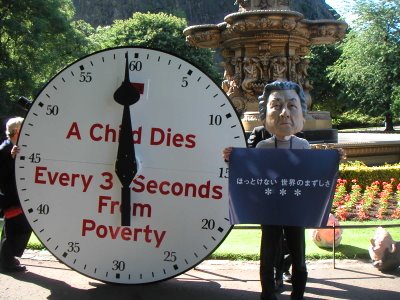
Poor people are dying needlessly because global pharmaceutical giants continue to monopolise drugs for diseases like cancer and AIDS, Oxfam claims.
Rich countries - the US, in particular - are "bullying" developing countries to protect their pharmaceutical products, the charity claims. It said these countries are reneging on their promise to improve public health in developing countries by adopting "selfish" protectionist policies.
Five years ago, the Doha Declaration pledged to put health before profits. It allows developing countries to access generic versions of patented drugs - which are significantly cheaper - under World Trade Organisation rules, known as TRIPS.
But Oxfam said conditions in developing countries have become significantly worse since 2001. And according to the World Health Organisation, 74 per cent of Aids medicine is still under a monopoly, 77 per cent of Africans have no access to Aids treatment and 30 per cent of the world has no access to essential medicines.
Oxfam's head of its Make Trade Fair campaign, Celine Charveriat, accused rich countries of "breaking the spirit" of the declaration.
She said: "That hasn't happened. We've gone backwards. People are still suffering or dying needlessly. "Global health statistics are grim but the US continues to negotiate trade deals with even stricter rules that limit how a country can use public health safeguards."
More at Channel 4
Rich countries - the US, in particular - are "bullying" developing countries to protect their pharmaceutical products, the charity claims. It said these countries are reneging on their promise to improve public health in developing countries by adopting "selfish" protectionist policies.
Five years ago, the Doha Declaration pledged to put health before profits. It allows developing countries to access generic versions of patented drugs - which are significantly cheaper - under World Trade Organisation rules, known as TRIPS.
But Oxfam said conditions in developing countries have become significantly worse since 2001. And according to the World Health Organisation, 74 per cent of Aids medicine is still under a monopoly, 77 per cent of Africans have no access to Aids treatment and 30 per cent of the world has no access to essential medicines.
Oxfam's head of its Make Trade Fair campaign, Celine Charveriat, accused rich countries of "breaking the spirit" of the declaration.
She said: "That hasn't happened. We've gone backwards. People are still suffering or dying needlessly. "Global health statistics are grim but the US continues to negotiate trade deals with even stricter rules that limit how a country can use public health safeguards."
More at Channel 4
1 comment:
My issue is Zyprexa which is only FDA approved for schizophrenia (.5-1% of pop) and some bipolar (2% pop) and then an even smaller percentage of theses two groups.
So how does Zyprexa get to be the 7th largest drug sale in the world?
Eli Lilly is in deep trouble for using their drug reps to 'encourage' doctors to write zyprexa for non-FDA approved 'off label' uses.
The drug causes increased diabetes risk,and medicare picks up all the expensive fallout.There are now 7 states (and counting) going after Lilly for fraud and restitution.
--
Daniel Haszard
Post a Comment